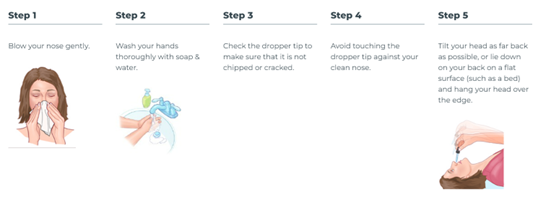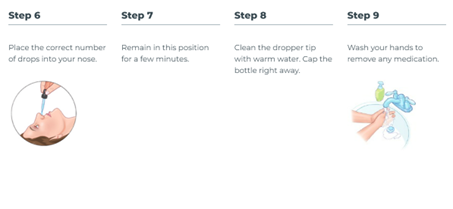Oxymetazoline Nasal Drop
2025/07/30
Oxymetazoline is used to relieve nasal congestion.
Oxymetazoline nasal drops should only be used for short periods of time (maximum consecutively for 5 to 7 days). A treatment-free period should precede any repeated use to minimise risk of rebound nasal congestion.
Administering the medication
| Steps | Description |
|---|
| 1 | Blow your nose gently. |
| 2 | Check the dropper tip to make sure that it is not chipped or cracked. Avoid touching the dropper tip against your clean nose. |
| 3 | Tilt your head as far back as possible, or lie down on your back on a flat surface (such as a bed) and hang your head over the edge. |
| 4 | Place the correct number of drops into your nose. |
| 5 | Remain in this position for a few minutes. |
| 6 | Clean the dropper tip with warm water. Cap the bottle right away. |
| 

|
Inform your healthcare professional if:
- You are allergic to oxymetazoline or any of the excipients in the nasal drop.
- You are pregnant, planning to become pregnant, or breastfeeding.
- You are on monoamine oxidase inhibitor (i.e. selegiline).
- Increase intraocular pressure, especially narrow-angle glaucoma.
- You have poorly controlled cardiovascular disease (e.g. coronary heart disease, hypertension) or metabolic disease (i.e. hyperthyroidism, diabetes) or hyperplasia of prostate.
- You have a medical history of pheochromocytoma.
Occasionally, you can experience burning or dryness of the nasal mucosa and sneezing.
In rare cases, after the effect has worn off, you may feel an intense sensation of “blocked” nose (reactive hyperaemia) and nose bleed (epistaxis).
Overuse of oxymetazoline nasal drops may lead to systemic sympathomimetic effects like palpitations, accelerated pulse (tachycardia) and increase in blood pressure.
The symptoms of a drug allergy include one or more of the following:
- Swollen face/eyes/lips/tongue
- Difficulty in breathing
- Itchy skin rashes over your whole body
If you experience any of these symptoms, you should stop your medication and see your healthcare professional immediately.
Store in a cool and dry place, away from direct sunlight. Keep this medication away from children.
Discard six months after opening.
Pack this medication into a black trash bag and seal it tightly before throwing into the rubbish chute or bin.
Disclaimer:
- Please take note that the above is not a complete list of all possible side effects. If you have any concerns about your medication or if you have other side effects that you think are caused by this medication, please consult your doctor or pharmacist.
- If you take more than the recommended dose, please seek medical advice immediately. The information provided on this page does not replace information from your healthcare professional.
- Please consult your healthcare professional for more information.
Back to 'Medications' >



















